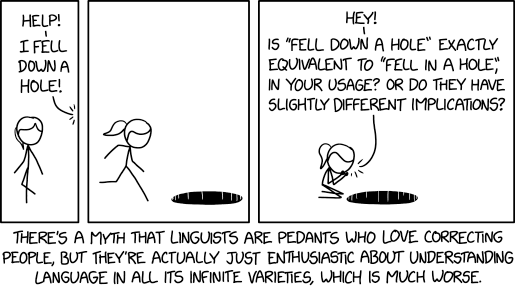Exploring Linguistics: A Scientific Approach to Language
Written on
Chapter 1: Introduction to Linguistics
Linguistics is often misunderstood, particularly when I introduce myself as a linguist. People frequently ask, “How many languages do you speak?” This term can mean different things; while it can refer to polyglots or translators, being a linguist isn’t solely about knowing multiple languages. I am fluent in both English and Portuguese, but my expertise lies in the scientific study of language itself.
When people inquire about the scientific study of language, they often conflate it with grammar rules and pronunciation, typically associated with dictionaries and academic guidelines. This raises a critical question: What constitutes the scientific study of language?
A common misconception is that linguistics focuses solely on grammar and usage rules. In reality, it is a branch of cognitive science that investigates the mind. Language is a cognitive skill, and like other cognitive functions, it can be examined scientifically. Linguists delve into the structure and aspects of this skill, posing questions like, “What do we understand when we learn to speak a language?”
In linguistics, the subject of inquiry is not merely the content of dictionaries or style guides but the underlying cognitive processes that govern language use. These resources often reflect prescriptive norms that dictate how language should be used, rather than how it is actually used in practice.

In scientific inquiry, the focus is on understanding reality rather than prescribing ideal forms. For example, astronomers investigate how planets behave in their orbits, rather than speculating on how they should move. In linguistics, we similarly ask: “How do individuals utilize language, and what insights can we gain about the mind through linguistic behavior?”
To illustrate the intricacies of linguistic competence, let’s analyze a simple sentence: “The dog chased the cats.” Producing this sentence requires an understanding of several linguistic components.
First, phonetic competence is essential. Phonetics, the study of speech sounds, involves articulatory phonetics, which looks at how sounds are generated in the mouth. A typical native American English speaker produces about 26 consonants and roughly 15 vowels. Each sound arises from rapid, coordinated movements of speech organs.
The first video titled "Introduction to Linguistics: First Lecture" provides an overview of these foundational concepts in linguistics.
Next, a native speaker must possess phonological competence, which includes understanding the distribution of sounds. For instance, in the word “chased,” the final consonant is pronounced as a ‘t’ rather than a ‘d,’ due to a phonological rule in English that prohibits a ‘d’ from following an ‘s’ at the end of a syllable. Such phonological rules are vital aspects of linguistic competence.
Additionally, morphological competence is crucial, as it involves understanding word formation. For example, in “The dog chased the cats,” the verb “chased” consists of two parts: “chase” and the suffix “-ed,” indicating past tense.
Furthermore, syntactic competence governs how words combine to form phrases and sentences. The sentence “The dog chased the cats” can be rearranged in numerous ways, yet only specific structures conform to English syntax.
Consider, for instance, how questions are formed. Transforming “The dog chased the cats” into a question involves systematic changes in word order and verb forms, illustrating the complexity of syntactic rules that speakers follow unconsciously.
The second video, "What is Linguistics? - Introduction to Linguistics," further elucidates the foundational principles of language study.
Finally, semantics, the study of meaning, intertwines with syntax. The arrangement of words affects interpretation; for example, “The cats chased the dog” changes the meaning entirely. Noam Chomsky’s sentence, “Colorless green ideas sleep furiously,” illustrates the independence of syntax and semantics; though grammatically correct, it lacks coherent meaning.
In summary, even the simplest sentences require a complex interplay of phonetic, phonological, morphological, syntactic, and semantic competencies. Remarkably, native speakers navigate this complexity effortlessly, often without conscious awareness of the rules governing their speech.
Language operates as a hidden code within our minds, allowing us to communicate effectively. Linguists observe consistent patterns in speech that reveal adherence to underlying rules, even if speakers are unaware of them.
While some may argue that writing involves conscious rule-following, linguists primarily focus on spoken language. Writing, which encodes language, is governed by different conventions and often lacks the complexities inherent in spoken forms.
Ultimately, all humans possess native-level proficiency in at least one language, regardless of literacy. Writing is a skill acquired through training, while spoken language is an innate human ability.
Linguists strive to uncover the subconscious rules that govern language use through scientific observation. We distinguish between prescriptive grammar—rules dictating how language should be used—and descriptive grammar, which reflects how language is actually employed by speakers. This distinction is crucial for understanding linguistic competence, a fundamental aspect of being human.
A common critique of non-standard language use often invokes the notion of “incorrect grammar.” This raises the question of what standards define correctness. Prescriptive norms often originate from historical conventions rather than inherent language rules, which are universal and accessible to all speakers.
For further exploration of these concepts, I recommend the following readings:
- Language Myths: This collection of essays by leading linguists addresses common misconceptions about language, making it an excellent resource for the curious reader.
- Language Files: Materials for an Introduction to Language and Linguistics, 13th Edition: A comprehensive textbook ideal for those looking to dive deeper into the field.

If you’d like to support my blog, consider buying me a coffee at the link below!
